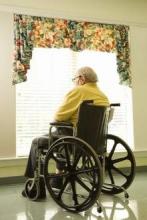Most nursing home residents with advanced dementia receive "medications of questionable benefit," given that they are terminally ill and that the goal of their care should be comfort rather than long-term prevention, according to a report published online Sept. 8 in JAMA Internal Medicine.
Researchers analyzed data from a long-term-care pharmacy that serves about half of the 1.3 million residents of nursing homes across the country to characterize the use of medications that have been deemed "never appropriate" in this patient population: cholinesterase inhibitors, memantine, antiplatelet agents other than aspirin, lipid-lowering drugs, sex hormones, hormone antagonists, leukotriene inhibitors, cytotoxic chemotherapy, and immunomodulators. This cross-sectional study comprised a nationally representative sample of 5,406 nursing home residents, and the outcome of interest was prescription of any of these agents during a 90-day observation period, said Dr. Jennifer Tjia of the department of quantitative health sciences, University of Massachusetts, Worcester, and her associates.
A total of 2,911 (53.9%) of these patients received at least one drug of questionable benefit, with the prevalence ranging from a low of 45% in the mid-Atlantic region to a high of 65% in the West South Central region of the United States. The most frequently used unnecessary medications were cholinesterase inhibitors (36%) and memantine (25%), which are typically given in early dementia to delay or prevent institutionalization – clearly not the treatment goal for this nursing home population. Another 22% of the patients received lipid-lowering agents and 7% received antiplatelet drugs, which are intended to prevent long-term cardiovascular complications – not beneficial in those with limited life expectancy, the researchers said (JAMA Intern. Med. 2014 Sept. 8 [doi:10.1001/jamainternmed.2014.4103]).
Moreover, well known adverse effects of cholinesterase inhibitors and memantine include syncope, hip fracture, arrhythmia, and urinary retention; adverse effects of statins in the elderly include myopathy, memory loss, confusion, elevated blood glucose, and diabetes.
"Despite standards of care that call for minimizing interventions that are unnecessary or provide little benefit in order to focus on interventions that optimize quality of life, polypharmacy remains common in this population." Oral medications are a particular burden for dementia patients, who frequently have swallowing difficulties, and adverse drug effects are a particular burden because these patients have difficulty expressing the symptoms they feel, Dr. Tjia and her associates noted.
The mean 90-day drug expenditure was significantly higher for nursing home patients who received these agents of questionable benefit than for those who did not. And more than 35% of their drug costs, $816 per resident per quarter, was attributable to these unnecessary medications.
This study was supported by the Agency for Healthcare Research and Quality and the National Institute on Aging. Dr. Tjia reported no financial conflicts of interest; one of her associates reported receiving grants from Daiichi Sankyo.

